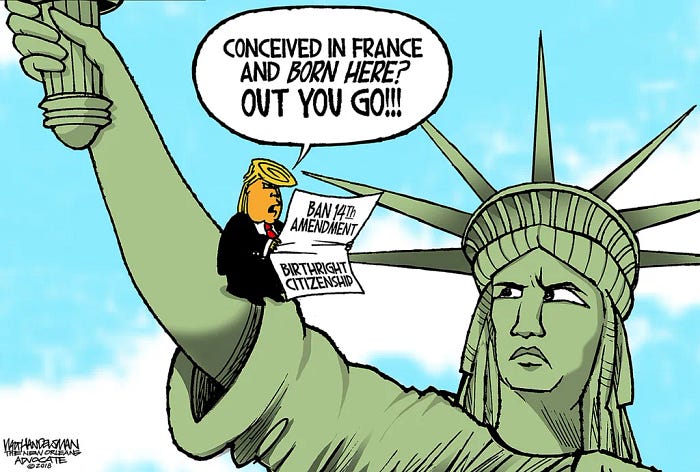Only hours after failing to place his hand on the Bible for his swearing-in, Trump has pushed forward an attempt to rewrite the Constitution with his own interpretation. This is a direct attempt to change the 14th Amendment without congressional approval. The order attempts to reinterpret the language of the amendment, effectively altering its meaning without the formal process of amendment.

“All persons born or naturalized in the United States, and subject to the jurisdiction thereof, are citizens of the United States and of the State wherein they reside.”
The phrase in question is “subject to the jurisdiction thereof.” Historically, this part of the amendment has been interpreted to exclude children of foreign diplomats born in the United States, as they are considered under the jurisdiction of their parents’ home country and thus have diplomatic immunity.
The Decision in, United States v. Wong Kim Ark (1898), further clarified the interpretation of the 14th Amendment. In this case, the Court ruled that a child born in the United States to non-citizen parents who were legally domiciled and not employed in any official diplomatic capacity was indeed a U.S. citizen under the 14th Amendment. This decision has been a cornerstone of birthright citizenship and firmly established the principle that nearly all individuals born on U.S. soil are granted citizenship, regardless of their parents’ immigration status.
Trump’s reinterpretation seeks to expand this exception, targeting children of undocumented immigrants. The goal appears to be to strip these children of their citizenship, which would then remove a key obstacle to deporting their families. By arguing that these children are not “subject to the jurisdiction” of the United States, this reinterpretation aims to deny them the constitutional rights granted by birthright citizenship.
This maneuver raises significant legal and procedural questions. The language of the 14th Amendment is explicit, and altering its meaning through executive order circumvents the constitutional amendment process, which requires congressional approval and ratification by the states. Such an act undermines the checks and balances integral to the U.S. democratic system.
The broader implications of this reinterpretation highlight ongoing tensions in U.S. immigration policy and constitutional interpretation. While there may be concerns about immigration enforcement, any attempt to modify constitutional rights should follow the proper legal channels to preserve the integrity of the democratic process.
No comments:
Post a Comment